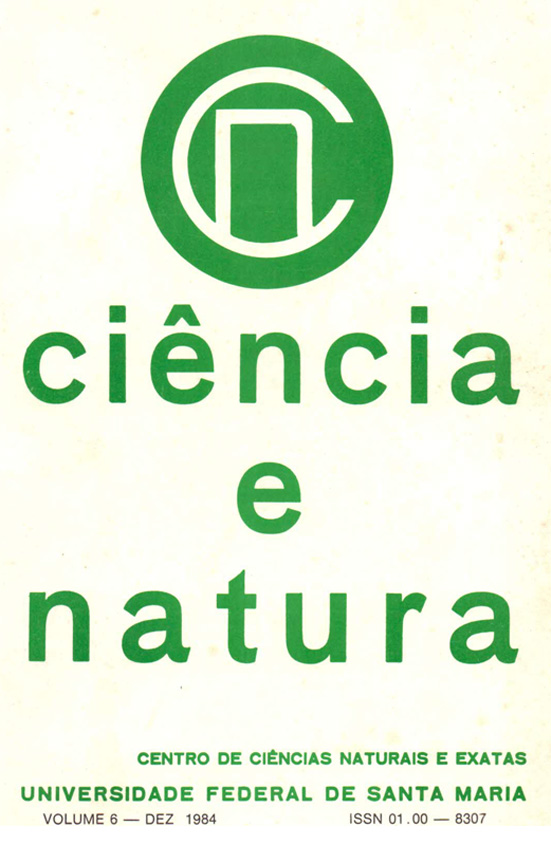Função BETA aplicada na distribuição de frequência de CAPs das principais espécies florestais do Rio Grande do Sul
DOI:
https://doi.org/10.5902/2179460X25077Resumo
No presente trabalho utilizou-se a função BETA para ajustar a distribuição das circunferências das árvores, medidas a 1,30m do solo, em todos os tipos florestais identificados no inventário florestal do Rio Grande do Sul. A estimativa dos parâmetros da função foi efetuada pelo programa BETKLA, em FORTRAN, segundo ZOEHRER (1970). A função BETA subestimou as frequências dos CPAs nos dois extremos da distribuição, em todos os tipos florestais.Downloads
Referências
HUEK, K. As florestas da América do Sul. São Paulo, Ed. Polígono A.S., 1972. 466 p.
IBDF - INSTITUTO BRASILEIRO DE DESENVOLVIMENTO FLORESTAL. Inventário Florestal Nacional: Florestas Nativas do Rio Grande do
Sul. Brasilia. 1983. 345 p.
LINGREN, B.W. Statistical Theory. 39 ed. New York, MacMillian, 1978, 614 p.
LOETSCH, F.; ZOEHRER, F.; HALLER, K.E. Forest: Inventory. Berlin, B.L.V., 1975.469 p.
RAMBO, P. e R. A fisionomia do Ria Grande do Sul. Porto Alegre,
Livraria Selbach, 1956, 456 p.
SUDESUL - SUPERINTENDÊNCIA DO DESENVOLVIMENTO DA REGIÃO SUL. A Vegetação atual da Região Sul. Porto Alegre, 1978. 115 p. (Serie Planejamento e Estudes Regionais, 2).
WETTSTEIN, R.R.V. Plantas do Brasil: Aspectos da Vegetação do Sul
do Brasil São Paulo, Ed. Edgard B1~cher, Ltda; 1970. 126 p.
ZOEHRER, F. BETKLA, a computer program for best fit of stem-diameter distribuition or any other frequency distribuitions. Mitteilungen der Bundesforchungstalt forst u. Holzwirtschaft. Reinbek/Hamburg, 1970. 35 p.
Downloads
Publicado
Como Citar
Edição
Seção
Licença
Para acessar a DECLARAÇÃO DE ORIGINALIDADE E EXCLUSIVIDADE E CESSÃO DE DIREITOS AUTORAIS clique aqui.
Diretrizes Éticas para Publicação de Revistas
A revista Ciência e Natura está empenhada em garantir a ética na publicação e na qualidade dos artigos.
A conformidade com padrões de comportamento ético é, portanto, esperada de todas as partes envolvidas: Autores, Editores e Revisores.
Em particular,
Autores: Os Autores devem apresentar uma discussão objetiva sobre a importância do trabalho de pesquisa, bem como detalhes e referências suficientes para permitir que outros reproduzam as experiências. Declarações fraudulentas ou intencionalmente incorretas constituem comportamento antiético e são inaceitáveis. Artigos de Revisão também devem ser objetivos, abrangentes e relatos precisos do estado da arte. Os Autores devem assegurar que seu trabalho é uma obra totalmente original, e se o trabalho e / ou palavras de outros têm sido utilizadas, isso tem sido devidamente reconhecido. O plágio em todas as suas formas constitui um comportamento publicitário não ético e é inaceitável. Submeter o mesmo manuscrito a mais de um jornal simultaneamente constitui um comportamento publicitário não ético e é inaceitável. Os Autores não devem submeter artigos que descrevam essencialmente a mesma pesquisa a mais de uma revista. O Autor correspondente deve garantir que haja um consenso total de todos os Co-autores na aprovação da versão final do artigo e sua submissão para publicação.
Editores: Os Editores devem avaliar manuscritos exclusivamente com base no seu mérito acadêmico. Um Editor não deve usar informações não publicadas na própria pesquisa do Editor sem o consentimento expresso por escrito do Autor. Os Editores devem tomar medidas de resposta razoável quando tiverem sido apresentadas queixas éticas relativas a um manuscrito submetido ou publicado.
Revisores: Todos os manuscritos recebidos para revisão devem ser tratados como documentos confidenciais. As informações ou ideias privilegiadas obtidas através da análise por pares devem ser mantidas confidenciais e não utilizadas para vantagens pessoais. As revisões devem ser conduzidas objetivamente e as observações devem ser formuladas claramente com argumentos de apoio, de modo que os Autores possam usá-los para melhorar o artigo. Qualquer Revisor selecionado que se sinta desqualificado para rever a pesquisa relatada em um manuscrito ou sabe que sua rápida revisão será impossível deve notificar o Editor e desculpar-se do processo de revisão. Os Revisores não devem considerar manuscritos nos quais tenham conflitos de interesse resultantes de relacionamentos ou conexões competitivas, colaborativas ou outras conexões com qualquer dos autores, empresas ou instituições conectadas aos documentos.






